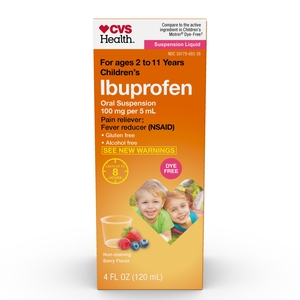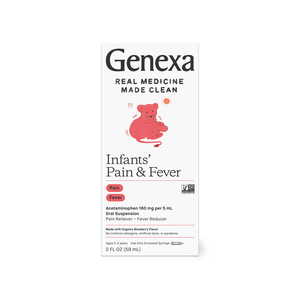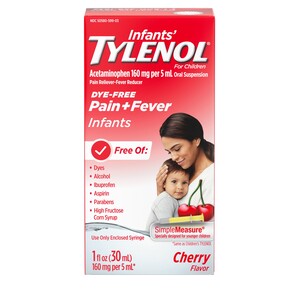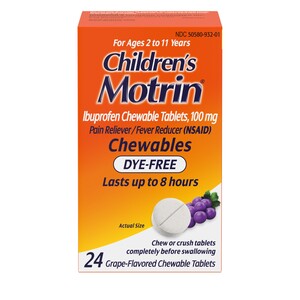Baby & Kids Pain & Fever
)
)
+ 2 options
)
)
)
)
+ 3 options
Shop more baby & kids health
Fever Reducers for Infants and Kids
CVS has a wide assortment of fever reducers for babies, infants and kids, both online and in-store, to ensure parents are prepared when their little one becomes ill with a high fever. Pain reliever medications are available in kid-friendly formats, such as concentrated drops and chewable tablets. Continue reading to find out which over-the-counter baby and kid pain and fever treatments may be the most beneficial in easing your child's discomfort.
Children's Acetaminophen
Acetaminophen is a popular pain reliever/fever reducer that is available in dosage forms for babies and kids. Acetaminophen is believed to act on the parts of the brain that receive pain messages and controls body temperature. Children's acetaminophen is commonly used to help alleviate common aches and pains and headaches and to help lower fevers. The medication is typically gentle to the stomach, making it preferred by some pediatricians.
NSAIDs for Kids
Non-steroidal anti-inflammatory drugs, or NSAIDs, are another type of medication that be given to children for pain or fevers. For kids, ibuprofen is generally the recommended NSAID. An NSAID works by helping reduce the amount of prostaglandins in the body. These chemicals may raise body temperature and cause sensations of pain. Unlike acetaminophen, NSAIDs may also ease inflammation while reducing discomfort. As a result, they are often recommended for injuries like muscle pulls and sprains. NSAIDS should never be used in infants less than 6 months of age.
Kid-Friendly Pain Medicine
Children's pain and fever relief products are available in a number of forms. Babies typically take concentrated drops that are administered with a medicine dropper. For toddlers and young children, liquid medications are often used. Older kids may take liquid medications or chewable tablets that are easier to swallow than conventional pills.
Baby Fever Reducer Safety Tips
Over-the-counter children's pain and fever relief products do not require a doctor's prescription; however, you should still consult your medical provider before giving your child any new medication for the first time. Your pediatrician can give you advice about which type of pain reliever is right for your child and tell you how much he or she should take and how often. Always follow the directions for use provided on the pain reliever packaging unless your health care professional gives you other instructions. Keep in mind that for low-grade fevers, children may not need a pain and fever reliever. Your medical provider can let you know when it is best to treat a fever.
Related Products baby allergy, baby flu, baby ear care, baby first aid, baby gas relief, baby medicine dispensers
What Fever Reducer Is Best for Infants?
Infants 3 months and older who develop a mild fever may be treated at home by using a fever reducer for infants, such as pediatrician-recommended Infants Tylenol Dye-Free Simple Measure Acetaminophen Oral Suspension. The best fever reducers for infants come in berry-flavored drops designed to be easy on little tummies and start reducing aches, pains and fevers within about 15 minutes. Parents may check their infant's temperature as needed with a children's digital thermometer before and after giving a fever reducer. However, newborns ages 3 months and younger should be seen by a doctor immediately whenever a fever is present.
How to Use Fever Reducer for Infants
When giving your infant a fever reducer, it's essential that you carefully follow the dosage instructions on the pain reliever packaging. Your infant's pediatrician can also advise you on which is the safest fever reducer for infants and how much should be given. As a general rule, doses are based on your child's age and weight and are normally administered with an easy-to-use and mess-free dosing syringe included with the medication. Simply dispense the liquid drops slowly into your infant's mouth and repeat, if needed, every 6-8 hours. Keep in mind that infants and children with low-grade fevers may not require a pain and fever reducer.
What Can I Give My Baby for Pain and Fever?
Infant fever reducers, including Tylenol, Advil and Motrin, can be given to babies for up to 8 hours of relief from pain and fever, as well as minor aches and pains caused by colds, flu, headaches and toothaches. Other ways to help reduce your child's fever and provide extra comfort include applying a cool compress to their forehead and feet, lowering the temperature of the room and keeping them fully hydrated. Parents may also try sponging their infant down with lukewarm water and dressing them in lightweight clothing. For children under 2 years old, it's always a good idea to consult with a doctor before giving your baby any type of medication for pain.
)
)
)
)
)
)
)
)
)
)
)
)
)
)
)

)
)
